Category Archives: Related Links
PUBLIC DEFENDER MEETS SCHOOL CHILDREN.

On January 23, 2026, the Public Defender of Georgia hosted students of Tbilisi Gogita Kiknadze Public School No. 182.
Levan Ioseliani introduced the students to the human rights protection system, the mandate of the Public Defender’s Office and the main areas of activity. He spoke in detail about the importance of knowledge of human rights in the everyday life of young people.
The students showed interest in specific aspects of the Office’s activities, including, in particular, the right to freedom of expression and education. In addition, their questions concerned the steps taken by the Public Defender in relation to legislative amendments and in general in the direction of protecting children’s rights.
The students had the opportunity to personally receive answers to issues of interest to them from the Public Defender.
The meeting took place on January 24 – International Day of Education.
TIMOR-LESTE HOSTS KEY ASEAN WORKSHOP ON MIGRATION AND HUMAN RIGHTS.
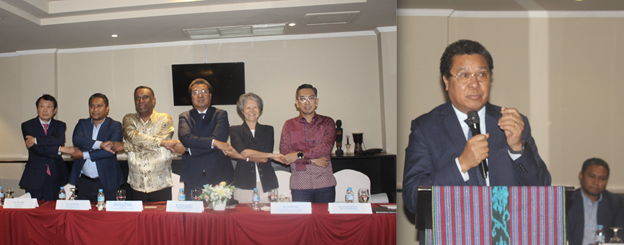
Dili, 27 January 2026– The Ombudsman for Human Rights and Justice, Virgílio da Silva Guterres “Lamukan”, delivered opening remarks at a major three-day workshop on International Migration and Human Rights this week. The event, held from January 27-29, 2026, at Novo Turismo in Dili, was organized by the Ministry of Foreign Affairs and Cooperation in coordination with the Japan International Cooperation Agency (JICA) and Universiti Kebangsaan Malaysia (UKM). The workshop marks a significant step in strengthening Timor-Leste’s engagement on regional issues following its accession as a full ASEAN member in October 2025.
In his address, the Ombudsman framed migration as a fundamental “human story” of hope and dignity, while also highlighting Timor-Leste’s specific realities as a country of origin, transit, and destination. He stressed that migrants are rights-holders and states are duty-bearers, calling for policies cantered on human rights and enhanced regional cooperation within ASEAN. The PDHJ was prominently involved, with Deputy Ombudsman for Good Governance, Rigoberto Monteiro, leading a session on protection mechanisms for migrant workers from the perspectives of the state, ASEAN, and National Human Rights Institutions.
The comprehensive agenda, led by resource person Associate Professor Dr. Andika Wahab of UKM, covered critical themes including an overview of ASEAN’s migration landscape, labour migration, forced migration, trafficking in persons, and the intersection of migration with development. The workshop aimed to translate knowledge into concrete policy reforms and strengthen institutional capacity, particularly for the PDHJ, which regularly handles complaints related to migrant worker rights violations and recruitment malpractices.
The workshop brought together 22 nominated PDHJ staff members, government officials, diplomats, and development partners for interactive discussions. It served as a platform to enhance coordination among national institutions and align Timor-Leste’s migration governance with ASEAN frameworks and international human rights standards, ensuring the protection of migrants’ rights as both a legal obligation and a moral imperative for the nation.
COOPERATION ESTABLISHED BETWEEN THE OMBUDSMEN OF UZBEKISTAN AND MALAYSIA.
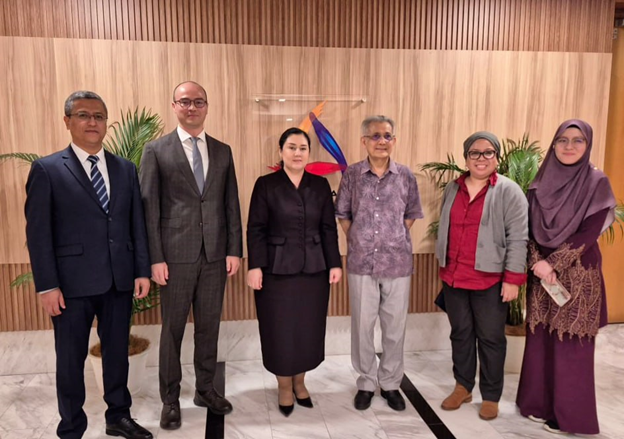
On 21 January of this year, the Commissioner of Oliy Majlis of the Republic of Uzbekistan for Human Rights (Ombudsmen), Feruza Eshmatova, held a meeting with the Chairperson of the Human Rights Commission of Malaysia (SUHAKAM), Dato’ Seri Mohd Hishamudin Md Yunus.
During the meeting, the parties exchanged experience on issues related to mandates in the field of protecting human rights and freedoms, the activities of national institutions, practices of handling complaints, as well as cooperation with parliaments.
At the conclusion of the meeting, a “Roadmap” aimed at further strengthening bilateral cooperation in the field of human rights, exchanging experience, and implementing joint initiatives was approved.
For information: The Human Rights Commission of Malaysia (SUHAKAM) was established under the “Human Rights Commission of Malaysia Act” adopted by Parliament in 1999 and has been operating since 2000. Today, the Malaysian Ombudsman is accredited with “A” status by the Global Alliance of National Human Rights Institutions.
On the same day, a meeting was organized at the Embassy of Uzbekistan in Malaysia with compatriots living and studying in Malaysia. During the meeting, an open and active dialogue was held with citizens, and their appeals and opinions were heard.
240 CITIZENS RECEIVE PENDING DUES OF RS230 MILLION AFTER INTERVENTION OF HONOURABLE OMBUDSMAN PUNJAB.

The Office of the Ombudsman Punjab has achieved another major milestone in resolving pending financial issues of citizens, ensuring the disbursement of Rs 230 million to 240 citizens across the province through effective, timely and proactive intervention.
The recovered amounts pertained to group insurance, family pension, General Provident (GP) Fund, financial relief as well as marriage, farewell and death grants.
The affected citizens had approached the Honourable Ombudsman Punjab after repeated refusals or delays by the departments concerned in releasing their pending dues. Taking prompt notice of the complaints, the Honourable Ombudsman Punjab issued directives to the relevant departments, leading to successful recoveries and payments.
As a result, Rs 191.832 million was paid to 110 citizens as arrears, Rs 9.950 million to 29 citizens as family pension, Rs 1.935 million to seven citizens as death grant, Rs 14.5 million to 57 citizens as marriage grant, Rs 390,000 million to eight citizens as financial relief, Rs 10.039 million to 21 citizens as GP Fund, Rs 575,000 to four citizens as group insurance, and Rs 825,000 to four citizens as farewell grant.
Reaffirming its commitment, the Office of the Ombudsman Punjab stated that it would continue its uninterrupted efforts to safeguard citizens’ rights and ensure the swift and hassle-free resolution of public grievances, in line with its mandate to provide prompt justice.
THE OMBUDSMAN RECEIVES THE DELEGATION HEADED BY THE PRESIDENT OF THE UNION OF MEDIATORS OF THE TURKIC WORLD.
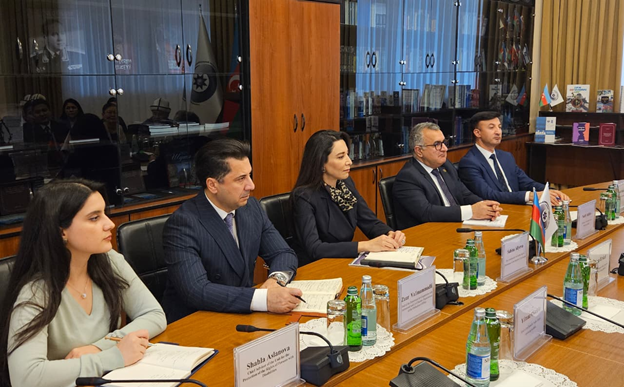
Ms. Sabina Aliyeva, the Commissioner for Human Rights (Ombudsman), received Mr. Yakup Erikel, the President of the Union of Mediators of the Turkic World. Mr. Orozbek Sydykov, Deputy Minister of Justice of the Kyrgyz Republic, and mediators from Kyrgyzstan attended the meeting.
During the meeting, the Ombudsman emphasized that the Republic of Azerbaijan attaches great importance to cooperation with Turkic states and that consistent measures are being implemented to further develop existing relations.
Sabina Aliyeva noted that the Association of Ombudsmen and National Human Rights Institutions of Turkic States (TÜRKOMB) was established with the aim of further strengthening unity and cooperation among Turkic states in the field of protection of human rights and freedoms.
The Ombudsman spoke about the implementation of mediation in Azerbaijan and the legal reforms carried out in this area. She noted that, in order to review applications related to mediation activities, improve legislation, and organize awareness-raising efforts, a close cooperation exists between the Ombudsman Office and the Mediation Council.
Yakup Erikel, President of the Turkic World Mediators Union, who led the delegation, expressed his gratitude to Ombudsman Sabina Aliyeva for her warm reception.
A mutual exchange of views on issues of common interest also took place during the meeting.
OMBUDSMAN PUNJAB OFFICE ACTIVELY PARTICIPATES IN WEBINAR ON ISO 9001:2015 HELD UNDER AFRICAN OMBUDSMAN RESEARCH CENTRE.
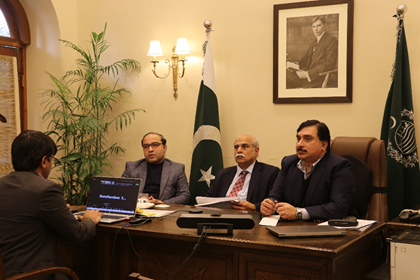
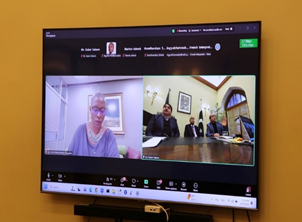
The African Ombudsman Research Centre (AORC) organized a webinar on 20th January 2026 titled “Implementing ISO 9001:2015: Strengthening Quality Management and Accountability in African Ombudsman Institutions”. The Office of the Ombudsman Punjab (Pakistan) took part as a featured contributor, sharing practical experience and institutional insights on the application of the ISO 9001:2015 Quality Management System (QMS) within an ombudsman framework.
Secretary, Ombudsman Punjab, Kaiser Saleem highlighted the meaning and importance of ISO 9001:2015 in improving institutional performance and enhancing the quality of public service delivery.
Advisor (Research) Ahmad Yar Khan elaborated on the effective role of ISO 9001:2015 QMS in strengthening accountability mechanisms and improving service quality, while Advisor Samiullah gave a comprehensive briefing on the practical steps involved in the implementation of ISO 9001:2015 QMS in the Ombudsman Office.
Ayesha Hamid, Ombudsman Punjab, IOI First Vice President and Director Asian Region IOI concluded the webinar by announcing an international internship opportunity at the Office of the Ombudsman Punjab, offering practical exposure to ISO 9001:2015 implementation and the OPMIS framework.
COMPREHENSIVE INSPECTION OF HIRING PRACTICES AT PUBLIC SERVICE-RELATED ORGANIZATIONS UNCOVERED 832 CASES OF FAIR HIRING VIOLATIONS.
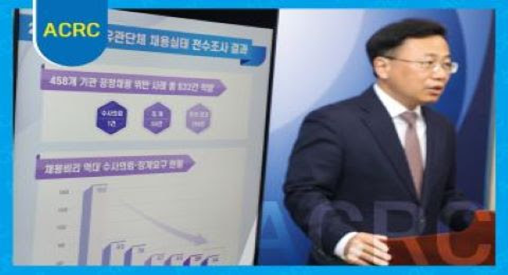
– ACRC announced results from an inspection of 931 public service-related organizations
– 34 hiring corruption cases detected; implicated persons referred for investigation and disciplinary action requested
The Anti-Corruption and Civil Rights Commission (ACRC, Chairperson Ryu Chul Whan) announced the results of a comprehensive inspection of hiring practices, conducted from February to October this year with central ministries including the Ministry of Economy and Finance, local governments, and offices of education, covering 931 public service-related organizations.
Of a total 1,423 organizations, 492 were excluded from this year’s inspection because they had no hiring in the previous year or had no hiring corruption in the past three years.
The inspection examined whether new hires conducted by public service-related organizations in 2024 were carried out appropriately in accordance with relevant laws and guidelines, through parallel investigations by each organization’s supervisory body and the ACRC.
The inspection revealed 832 cases of violations of fair-hiring regulations across 458 organizations, of which 34 constituted hiring corruption subject to referral for investigation or disciplinary action. This is an 81.3% decrease from 2019, when there were 182 hiring-corruption cases, showing a steady yearly decline.
| Category | 2019 | 2020 | 2021 | 2022 | 2023 | 2024 | 2025 | |
| Hiring irregularities | Referrals for investigation | 36 | 9 | 5 | 4 | 2 | – | 1 |
| Disciplinary actions | 146 | 74 | 71 | 43 | 42 | 39 | 33 | |
| Negligence | Cautions/Warnings | 1,160 | 862 | 799 | 774 | 823 | 822 | 798 |
In the 34 hiring-irregularity cases uncovered in this inspection, the most common types were in following order: arbitrary selection of successful candidates (8 cases), arbitrary conduct of screening (8 cases), and inadequate verification of eligibility and disqualifying factors (5 cases)
※ Examples of the most frequently detected hiring irregularities:
① Arbitrary selection of successful candidates: Upon the establishment and announcement of the hiring plan, it was decided that successful candidates would be selected in order of highest total interview scores, however, during the actual interview process, the criteria for selecting successful candidates were arbitrarily changed, and candidates were selected in a manner that did not even meet the arbitrarily changed criteria.”
② Arbitrary conduct of screening: Despite knowing that the internal applicant did not meet the hiring qualification standards under the personnel regulations, the applicant was arbitrarily selected.
③ Inadequate verification of eligibility/disqualifications: the decision to hire the prospective employee was made without conducting the required background check for disqualifying factors.
Among the detected cases, one particularly egregious violation-illegal interference in hiring that severely undermined fairness-was referred for criminal investigation. The remaining 33 cases, which involved serious negligence that could affect candidate rankings, will be subject to disciplinary action.
< Case Referred for Investigation >
| ◦ In order to bring Applicant B’s screening score up to the passing threshold, HR team leader A gave a new scorecard to Evaluator C and requested a re-evaluation. C re-scored the applicant to meet the passing threshold. A then shredded the original scorecard and submitted the new one received from C.
* However, upon receiving a protest from an audit staff member, the scores were restored to those on the original scorecard. |
Additionally, 798 instances of negligence subject to “cautions or warnings” in the hiring process were identified.
The ACRC will continuously monitor implementation to ensure proper dispositions for 45 individuals involved in the 34 hiring-corruption cases and remedial measures for the 12 victims.
Lee Myung-soon, ACRC Vice Chairperson, said, “Thanks to consistent, sustained government efforts to eradicate hiring corruption in the public sector and foster a culture of fair hiring, it’s encouraging that such corruption is decreasing. However, we cannot yet claim that the public fully feels these results.”
He added, “Going forward, the ACRC will continue to lay the groundwork to ensure that future generations, who will carry our society forward, can receive fair evaluations in the hiring process, which is the first gateway to perform economic activity.”
WAFAQI MOHTASIB SECURES RELEASE OF PRISONERS HAVING COMPLETED THEIR TERMS.
Islamabad: 29 January 2026 – The Wafaqi Mohtasib, Mr. Ejaz Ahmad Qureshi intervened to secure the release of five prisoners recently, who were languishing in jail even after having completed their respective terms of imprisonment. They had been unable to arrange payment of petty amount of fines which they were supposed to pay for securing their release.
According to details, a resident of Sector G-14/3, Islamabad, namely Chaudhry Muhammad Din Shauq met the Wafaqi Mohtasib recently and donated an amount of Rs.100,000/- (rupees one hundred thousand only) for this purpose. The Wafaqi Mohtasib appreciated the noble gesture and directed the Registrar of his office to send the cheque of the said amount to the Superintendent, Central Jail, Rawalpindi and to pursue the matter with the jail authorities.
The cross cheque of the said amount was also promptly forwarded to the DDO of the jail, who acknowledged its receipt and communicated that necessary steps were being taken to take the issue to its logical end. Following the development, the Superintendent of the Jail sent a letter of thanks addressed to the Wafaqi Mohtasib, informing him that against the amount received in the jail the following five prisoners have been released after adjustment of their respective fines. They included: Mr. Naeem Son of Moza; Mr. Liaqat Son of Raqeeb; Mr. Sadaqat Son of Wazeer; Mr. Nawab Son of Abdul Ghani and Mr. Zain Son of Ikram.
It may be added that a lot many prisoners are languishing in various Pakistani jails for non-payment of petty fines, even after completing their respective terms in prisons. This issue has lately assumed a serious dimension. The Wafaqi Mohtasib’s Office has initiated a number of steps for the welfare of prisoners in jails particularly the women and juveniles. He hoped that other members of the society would follow the noble tradition set by Chaudhry Shauq.
CHIEF OMBUDSMAN MR. MEHMET AKARCA MEETS WITH ANKARA REPRESENTATIVES OF MEDIA ORGANIZATIONS.
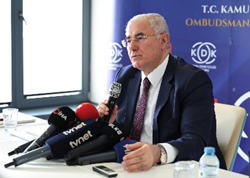
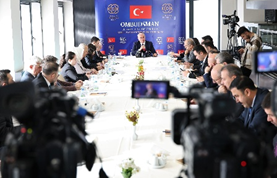
Chief Ombudsman of Türkiye, Mr. Mehmet Akarca, met with the Ankara representatives of media organizations on 9 January 2026 to share information on the work carried out by the Ombudsman Institution in 2025 and its outlook for 2026. The meeting was attended by Ombudsmen Mr. Ertunç Erkan Balta, Ms. Fatma Benli Yalçın, Mr. Sadettin Kalkan, Mr. Abdullah Cengiz Makas, Mr. Özcan Yıldız, and the Secretary General of the Ombudsman Institution Mr. Mehmet Doğan.
In his speech, Mr. Akarca congratulated members of the press on 10 January, Working Journalists’ Day, and emphasized the indispensable role of the press in democracy. He noted that the Ombudsman Institution received 21,034 complaints in 2025, bringing the total number of applications since the Institution began receiving complaints in 2013 to 262,000, with resolution rates exceeding 93 percent.
Emphasizing that the Ombudsman Institution is not an alternative to the judiciary but a complementary mechanism that helps reduce the courts’ workload, Mr. Akarca highlighted that complaints can be lodged free of charge through flexible procedures, including online. He added that complaints are finalized within a maximum of six months and examined based on the Constitution, national legislation, international conventions, the case-law of the European Court of Human Rights, and judicial precedents.
Mr. Akarca also stated that throughout 2025 the Ombudsman Institution organized public meetings and youth-oriented programs, and conducted visits to prisons, child advocacy centers, and various public institutions. Following his speech, he answered questions from members of the press.
INTEGRITY PROMOTION ACTIVITIES OF THE COMMISSION AGAINST CORRUPTION (CCAC) IN 2025.

In 2025, the Commission Against Corruption (CCAC) carried out a wide range of integrity promotion initiatives, covering public outreach, professional sector engagement, youth and campus education, volunteer training and international exchange:
- Public Outreach and Media Campaigns: Integrity messages were widely disseminated through microfilms, TV advertisements, campus activities, and the International Anti-Corruption Day campaign, ensuring broad community engagement.
- Professional Sector Training: Tailored legal and governance seminars were delivered to healthcare and financial institutions, reinforcing compliance awareness and fostering integrity culture in professional fields.
- Educational Resources Development: Workshops on short video production, children’s integrity stories, and the expansion of the Integrity Teaching Materials Advisory Group enriched teaching tools and enhanced integrity education quality.
- Youth and Campus Advocacy: Programs and projects engaged university and secondary school students, nurturing a new generation of integrity leaders through training, exchanges, and campus-based initiatives.
- Strengthening Volunteer Forces: New members joined the Integrity Volunteer Team, receiving training and participating in social and promotional activities to spread integrity values.
- International Exchange and Innovation: Macau youth teams showcased anti-corruption technology solutions at international competitions and forums, promoting cross-regional collaboration and innovation in integrity education.
Overall, the CCAC’s 2025 promotional activities built a multi-layered and multi-channel integrity network, combining local and international efforts, campus and community engagement, and educational and professional initiatives to further strengthen Macau’s culture of integrity.
